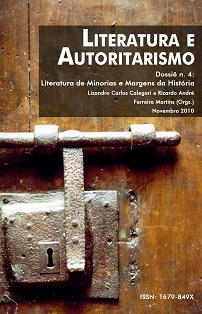A relação através de cartas entre Werther e Wilhelm
DOI:
https://doi.org/10.5902/1679849X74931Keywords:
Epistolary novel, Autobiography, GoetheAbstract
The present work comes from an interest on narratives from the self directed towards other person in “Os Sofrimentos do Jovem Werther”. It is evidenced a relationship between narrator and receiver, such relations will be worked along this article. The base approach is the thematic “the other within the self” represented in this novel. This choice comes from an investigation about the necessity of an interlocutor in writings about the self. On this matter, are established characteristics of epistolary genre as a writing product, and the importance of letters on that time: as a way of communication and as a strategy to close people. Dealing with writings about the self through epistolary method, the autobiographic genre comes up. It consists in a narrator who tells his story, living it again and seeing himself on the imaginary. Writing comes as a way to write about himself as well to express his needs of a reference from the other. Writing about the self is a way to see himself outside from an inner perspective, although the inside and the outside come from the same point. For this way the aim of this work is to investigate how the permanent influence from the other works on Werther’s character, such as on writings by himself and on the construction of the self. Werther’s letters are an inner way of expression that needs a confirmation from the other. These influences from the other are present on several contexts.
Downloads
References
ARFUCH, L. O espaço biográfico na (re)configuração da subjetividade contemporânea. IN: GALLE, H.; OLMOS, A. C.; KANZEPOLSKY, A; IZARRA, L. Z. Em primeira pessoa: abordagens de uma teoria da autobiografia. São Paulo: FAPESP, 2009.
BERTTIOL, M. R. B. A Escritura do Intervalo: A poética epistolar de Antônio Vieira. São Leopoldo: Editora Unisinos, 2008.
ENRIQUEZ, E. Da Horda ao Estado: Psicanálise do Vínculo Social. Rio de Janeiro: Jorge Zahar, 1990.
FREUD, S. Psicologia das Massas e Análise do Eu (1921). Edição Standard das Obras Completas de Sigmund Freud. Rio de Janeiro: Imago, vol. XVIII, 1980.
GOETHE, J. W. Os Sofrimentos do Jovem Werther. Porto Alegre: L&PM, 2007.
GAGNEBIN, J-M. Entre moi et moi-même (Entre eu e eu-mesmo) IN: GALLE, H.; OLMOS, A. C.; KANZEPOLSKY, A; IZARRA, L. Z. Em primeira pessoa: abordagens de uma teoria da autobiografia. São Paulo: FAPESP, 2009.
GINZBURG, J. O impacto da violência e constituição do sujeito: um problema da teoria da autobiografia. IN: GALLE, H.; OLMOS, A. C.; KANZEPOLSKY, A; IZARRA, L. Z. Em primeira pessoa: abordagens de uma teoria da autobiografia. São Paulo: FAPESP, 2009.
KLUGER, R. Verdade, mentira e ficção em autobiografias e romances autobiográficos. IN: GALLE, H.; OLMOS, A. C.; KANZEPOLSKY, A; IZARRA, L. Z. Em primeira pessoa: abordagens de uma teoria da autobiografia. São Paulo: FAPESP, 2009.
LACAN, J. O estádio do espelho como formador da função do eu (1949) IN: Escritos. Rio de Janeiro: Jorge Zahar, 1998.
MIGNOT, A. C. V.; BASTOS, M. H. C.; CUNHA, M. T. S. Refúgios do eu: educação, história, escrita autobiográfica. Florianópolis: Mulheres, 2000.
ROCHA, A. C. A Epistolografia em Portugal. Coimbra: Livraria Almedina, 1965.
Downloads
Published
How to Cite
Issue
Section
License
DECLARAÇÃO DE ORIGINALIDADE E EXCLUSIVIDADE E CESSÃO DE DIREITOS AUTORAIS
Declaro que o presente artigo é original e não foi submetido à publicação em qualquer outro periódico nacional ou internacional, quer seja em parte ou na íntegra. Declaro, ainda, que após publicado pela Literatura e Autoritarismo, ele jamais será submetido a outro periódico. Também tenho ciência que a submissão dos originais à Literatura e Autoritarismo implica transferência dos direitos autorais da publicação digital. A não observância desse compromisso submeterá o infrator a sanções e penas previstas na Lei de Proteção de Direitos Autorais (nº 9610, de 19/02/98).






